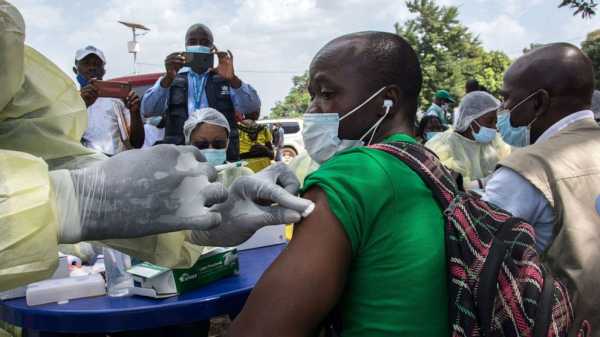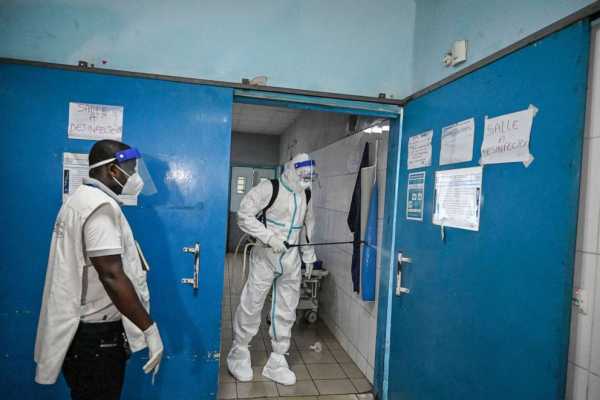COVID-19 wasn't an isolated global health threat, according to a new report.
As the COVID-19 pandemic raged on, public health professionals working behind the scenes successfully prevented six "epidemics that didn't happen," according to Prevent Epidemics, a project of Resolve to Save Lives, which is a non-for-profit organization with a stated mission of preventing disease outbreaks. As detailed in the new report, those six would-be outbreaks were stopped thanks to a swift response, well-coordinated local action, community engagement and strong health care work force.

In this Feb. 23, 2021, file photo, a health worker from the Guinean Ministry of Health cleans a suspected contact of an Ebola patient’s arm ahead of administering an anti-Ebola vaccine in Gueckedou, Guinea.Carol Valade/AFP via Getty Images, FILE
Unless viruses are contained quickly, infections like Ebola and even the common flu have the potential to spiral out of control, infecting thousands worldwide in an interconnected globe.
MORE: Flu cases, hospitalizations, deaths continue to surge across US
In Guinea, at the beginning of 2021, national and local emergency operations centers were activated within 24 hours of the first alert of an Ebola case. The country had made great investments in hiring and training public health officials following a previous Ebola outbreak in 2014-2016, according to Prevent Epidemics' report.
The results of the investments in Guinea were significant. While the two outbreaks were just a little over five years apart, the most recent outbreak had around 1,000 times lower cases and deaths and cost less than 100 million to contain the outbreak, compared to the 3.6 billion USD spent in 2014-2016, the report states.

In this Aug. 16, 2021, file photo, an agent of the National Institute of Public Hygiene, wearing a personal protective equipment (PPE) suit against the Ebola virus, disinfects the premises of the hospital in Cocody, Ivory Coast,following the passage of an Ebola patient.Sia Kambou/AFP via Getty Images, FILE
On the other side of the globe in late 2021, a cruise ship sailing off the coast of Rio de Janeiro had several crew members experiencing flu-like symptoms. A few days later, a handful of them had tested positive for Influenza A.
The ship immediately notified Brazilian authorities who reviewed medical logs, conducted lab testing, implemented quarantine protocols for close contacts, and isolated those who had tested positive in a hotel for daily monitoring.
Just 10 days after the investigations and protocols began, the outbreak was over with no new cases, according to the report. While usually not lethal for most, influenza still kills over half a million people worldwide each year, according to the report.
The report also details an incident in Tanzania — a young boy's family arrived at the hospital after a nearly three-hour drive from his village as he experienced muscle spasms in his limbs. Health care workers noted a healed bite wound on his leg, but it was too late – he died two hours after arrival.
A health care team set out to the boy's village and identified 10 individuals that may have been exposed to rabid dogs or the first patient. Everyone received the first dose of the rabies vaccine – which can be taken after exposure – just four days after the first case was identified. One of the people had already received medical care for a bite but was never even offered a lifesaving vaccine.
MORE: LA County recommends indoor masking after increase in COVID cases
Despite these notable successes, due to well-coordinated action by public health authorities, experts say public and global health has not been given the type of attention it deserves – an amount equivalent to that of other sectors of government that protect national security.
"Until governments start to think about public health the way they think about their military, for example, or their defense against their enemies, you're going to continue to see [health security and infectious disease threats] just be put on the backburner," Dr. Amesh Adalja, a senior scholar at Johns Hopkins Center for Health Security, told ABC News.
"I think one of the biggest challenges I continue to see play out over and over again, is that we don't resource public health for the challenges of the 21st century," Dr. Jennifer Nuzzo, a professor of epidemiology and director of the Pandemic Center at Brown University School of Public Health, told ABC News.

In this March 26, 2020, file photo, a cruise ship waits to disembark in Rio de Janiero.Buda Mendes/Getty Images, FILE
The U.S. spends trillions on national health expenditures, according to the Centers for Disease Control. Yet, increased funding often comes sporadically when there's an emergency – which is often too late, some say.
"Every time we have an emergency, we see how limited our infrastructure actually is, such that we are forced to appropriate emergency funds…and then as soon as the emergency starts to wane, we kind of let that funding lapse…and then the next emergency happens. This is not a sustained response, it's not a sustained infrastructure," said Nuzzo.
While funding is a key issue, some low-income countries have a strong track record of quickly stamping out would-be epidemics.
"When you see something work well, it's often because there is a proactive approach to the infectious disease problem and there's a lot of trust between the population and public health authorities," said Adalja.
He also points out that no two viruses are alike. Some infectious diseases can spread more easily – such as influenza or COVID which are incredibly difficult, if not impossible to contain.
"When you're looking at containment and how well a country does or what resources are needed, they're going to be different depending upon how transmissible the agent is. And a respiratory virus is kind of off the scale, they're not really containable," said Adalja.
In a society where humans socially interact and travel on a daily basis, viruses like COVID-19 are able to spread quite efficiently through human-to-human interaction.
Public health experts say pandemics are not inevitable. Even the devastating impact of the COVID-19 pandemic could have potentially been minimized if the response to the early outbreak in China had been stronger by limiting and monitoring travel. Experts argue the cost of the up-front investment is worth it, especially when weighed against the extraordinary economic toll of a global pandemic.
"All [people] have to do is just think back to COVID-19…all of that, how much did that cost? That economic toll, versus how little it would have been to be better prepared," said Adalja.
And with climate change and deforestation fueling an uptick in infectious diseases, the likelihood of another similar to COVID-19 occurring in the coming decades isn't negligible.
"This is the hallmark of our times. We need to make sure that our public health infrastructure is staffed and resourced appropriately to handle not just the recurring emergencies, but the possibility of multiple emergencies at once," Nuzzo said.
Sourse: abcnews.go.com






